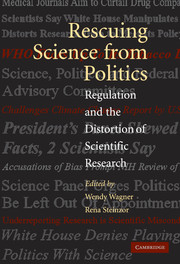Book contents
- Frontmatter
- Contents
- About the Contributors
- Acknowledgments
- Prologue
- Introduction: Principled Science
- PART I FREEDOM AND INDEPENDENCE
- PART II TRANSPARENCY AND HONESTY
- PART III A PUBLIC INFRASTRUCTURE FOR SCIENCE
- 10 Politicizing Peer Review: The Scientific Perspective
- 11 Politicizing Peer Review: The Legal Perspective
- 12 The Government Role in Scientific Research: Who Should Bridge the Data Gap in Chemical Regulation?
- PART IV RECOMMENDATIONS AND CONCLUSION
- Index
11 - Politicizing Peer Review: The Legal Perspective
Published online by Cambridge University Press: 04 August 2010
- Frontmatter
- Contents
- About the Contributors
- Acknowledgments
- Prologue
- Introduction: Principled Science
- PART I FREEDOM AND INDEPENDENCE
- PART II TRANSPARENCY AND HONESTY
- PART III A PUBLIC INFRASTRUCTURE FOR SCIENCE
- 10 Politicizing Peer Review: The Scientific Perspective
- 11 Politicizing Peer Review: The Legal Perspective
- 12 The Government Role in Scientific Research: Who Should Bridge the Data Gap in Chemical Regulation?
- PART IV RECOMMENDATIONS AND CONCLUSION
- Index
Summary
The Role of Peer Review in the Crusade for “Sound” Science
Because the public at large strongly supports a prominent government role in protecting health and safety, opponents of regulation have tried to put a more acceptable face on their efforts by cloaking their opposition as a demand for “sound science.” As professors Thomas McGarity and Donald Hornstein have explained in Chapters 1 and 5 of this book, rather than dispute the public policies behind protective regulation of people and the environment, the “sound-science” campaign attempts to convince the public that strong regulation lacks an acceptable scientific rationale. This approach gives regulatory opponents the advantage of casting themselves as favoring regulatory protection in general, but allows them to combat specific regulations on the grounds that such measures are based on poor – or “junk” – science.
The “sound-science” campaign seeks to blur the crucial distinction between incomplete data and poor-quality data. For example, an excellent study of the adverse health effects caused by heightened blood lead levels can be incomplete with respect to the hazards of heightened levels of lead in the air if the rates of transfer between airborne lead and blood lead are poorly understood. Regulatory opponents seek to convince the public that the absence of knowledge about air-to-blood transfer rates means that the scientific evidence about the hazards of lead to human health is of poor quality.
- Type
- Chapter
- Information
- Rescuing Science from PoliticsRegulation and the Distortion of Scientific Research, pp. 238 - 254Publisher: Cambridge University PressPrint publication year: 2006



